On Scripture
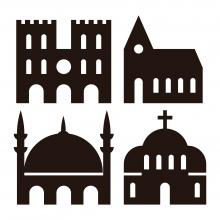
So here’s my question: Is it possible to fully embrace my religious tradition, to be able to articulate eloquently what is distinctive, and true, and holy, and meaningful, and beautiful and life-giving, and even genius about it without denigrating or playing off of another one? Does my tradition have to be superior to another in order to be true, holy, meaningful, etc.? Does it have to be the only one that conveys what is true, holy, meaningful, etc.? Do we have to compete or can we cooperate?
I’m a Christian. Not always a well-behaved or particularly perspicacious one, but a Christian all the same. I have intentionally been Christian for a long time now. Did I choose this tradition? Yes. Did I canvass all available religions before I chose, picking Christianity as the clearly superior one to all others? No. I am a mere mortal with limited time on this earth, so I have not explored all of the world’s religions, made a spread sheet to compare them like a Consumer Reports product search, and then chosen the “Best Buy.” Christianity rings true to my experience (except where it doesn’t) and gives me language to articulate what I’m experiencing and what I’m hoping for at any given moment. If you ask me, I can most certainly tell you what is distinctive, true, holy, meaningful, beautiful, life-giving, and even genius about it. You’ll need to set aside some time.

The emotional, physical, and spiritual violence that we inflict on one other is a sign that something is amiss in our world. A study from the World Health Organization paints the terrible truth that sex workers have a heightened risk of HIV. The sex and drug industry “tear up women and use them ‘til they throw them out" as Rev. Rebecca Stevens, Executive Director of Magdalene Ministries, says. Magdalene is a recovery program in Nashville, Tenn. for women who have histories of substance abuse and prostitution. Stevens has helped countless women get off the streets and put their lives back together. Yet there are so many more in need. It is clear that something is persistently bent on the annihilation of our bodies and souls. What can we say or do?

When called to lead, Solomon didn’t seek his own glory, his own comfort, his own peace. Solomon sought the shalom of all his people. So, too, did the leaders above — and God said yes.
The movement to protect black lives gestated in the womb of our nation for years before Ferguson, but God birthed a movement in that place — in part because of wise and discerning leaders of faith.
May God help us all to enter the one year commemoration of Michael Brown’s death and the uprising in Ferguson, Mo., by reflecting on how we responded to God’s question a year ago: “What should I give you in the face of black death?”

What happens when the heart of God is broken?
What happens when, in spite of our best efforts, we are overcome by human frailty, we are assaulted by the reality of the sins of humankind, and it appears there is nothing we can do that will overcome the tragic pain of our fractured lives? Such are the questions that come upon us when we read of the tortured life of King David, the pain and agony of his personal sin, and the tragedy that befell the life of Absalom, his beloved son.

“The court now holds that same-sex couples may exercise the fundamental right to marry. No longer may this liberty be denied to them.”
With these words, Justice Anthony Kennedy supported the decision of the Supreme Court to legalize same-sex marriage in the United States. Gay and lesbian couples across the country are celebrating this long-awaited decision. Those who are Christians are not only thanking the court but also thanking God. But we know that other Christians are not giving thanks — some are angry, others are confused and uncertain. Can a faithful Christian support the court’s decision? What can we say in response to questions voiced by some Christians?

One in thirty-one. That’s how many Americans are in in jail, in prison, on probation, or on parole. In the U.S., our incarceration rate is 10 times higher than that of other countries while our actual crime rate is lower than those same countries. Citing a 600% increase in the prison population since the 1960’s, with no correlating increase in crime, Michelle Alexander has called mass incarceration “the new Jim Crow.” When people of color represent 30% of the U.S. population, but 60% of those incarcerated, we are in league with David, staring at a towering giant, armed with a prayer and a handful of stones.
While the work before us is daunting, people of faith are called to fight giants. The Spirit who we remember in Pentecost, the Spirit who set the world on fire, has trusted us with this work. We are giant slayers, by God’s grace. For this reason, it is fitting that we revisit the story of the first giant slayer, a young boy who tended sheep and fought off bears and lions.
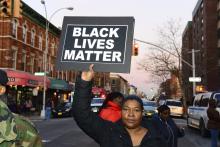
How does a social movement begin? How does frustration meet courage and conviction to bring a people together to engage in transformative work? What seeds do we plant to change a nation?
Social movements do not form out of thin air. They arise out of people’s suffering. Social movements are rooted in moments when people decide to change the conversation. The growing momentum around this new conversation creates a movement — a swell of influence in society that has the potential to change minds and transform society.

Political scandals are evergreen.
On any given week, one or another political leader, cultural star, or renowned athlete are experiencing an embarrassing and public downfall. Recently, we’ve born witness to the fall of a former Speaker of the House and a reality television celebrity. Next week, a new cast of characters will take their place. So ubiquitous are such scandals that they are the backdrop for the television show Scandal, a show I know is on because my Facebook page explodes with conversation about it!
But here’s the odd thing about these scandals, these falls from grace: they are so common that they shouldn’t shock us anymore. And yet these scandals sell newspapers, draw eyes on television. We can always muster some outrage at these all too common crimes.

The problems of the world can overwhelm us. When we are confronted by the Divine in the cries of human need, we may, like Isaiah, feel unworthy and ill-equipped to respond. However, if we allow this Divine experience to transform our human weakness, we can find the courage and strength to answer that call, as Jean Vanier has, with a bold, “Here I am!” What follows may be more difficult than we can imagine, but we can be confident in the knowledge that the work we do is Holy work.
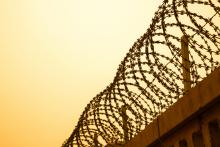
Borders have been crossed, eyes have been opened, and deeper relationships have been formed. All has been made possible — in the most surprising ways — by the active presence of the Spirit. The crossing of relational borders and the forging of new relationships continues to be enabled by the movement of the Spirit.
The only task of the people is to be open enough to perceive and respond to its prompting.
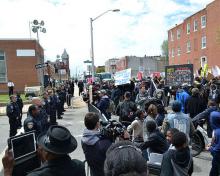
Perhaps we are here again because we do not really listen. We gaze at each other’s pain and lament, but we don’t really see in a way that will shift our vision, clarify our perspective. We hear each other’s stories but don’t really listen in a way that will change us in a profound way, lead us to question our deepest held assumptions. We post a hashtag but don’t embody these digital signatures in our everyday lives?

One of the hot button topics in America today is same-sex marriage. This issue has been in the news often due to same-sex marriage bans being struck down in state after state and on the minds of many after the controversial “religious freedom” law passed in Indiana (and similar ones already enacted in other states). And it has been in the hearts of many gay and lesbian couples faced with the possibility of being denied access to services because of who they are and who they love.
Imagine planning and preparing for your wedding for months, making decisions about guest lists, music, menus, seating charts, and attire. You go to the lone bakeshop in town to talk about your cake choices, only to be told that the baker is not willing to work with you because you are gay or a bi-racial couple or a couple from another faith tradition. Imagine the feelings of rejection, isolation, and denial that you would potentially feel, because the state allows this denial of services. This scenario is not hard to imagine, because it is legally allowed in many places throughout our country.
“Othering” happens all the time for many different reasons – not just sexuality, race, and gender.
About 10 years ago, my son and I were at a local park playing on the swings when a group of young boys started taunting a small child with a disfigured arm about 50 yards away from us. They were calling her ugly names and throwing small rocks and sticks in her direction. We had seen this little girl playing happily, running around, and laughing with delight. But now she looked terrified.
I heard the taunts and began moving that direction to intercede, but my son outran me. Only six years old at the time, he yelled at the boys, “Leave her alone. She’s just like us.” The boys saw and heard my son and likely saw an adult close on his heels. They abandoned their harassment and ran away.
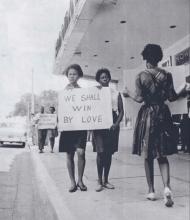
"We do not see things as they are. We see things as we are.” This Talmudic quote from Rabbi Shemuel ben Nachmani notes that seeing is not always vision. What we see in life is more than what the eye beholds. A person or circumstances right in front of us can be merely the surface of someone or something more profound.
The United States must forever recall the struggles, moves, and marching of the women and men across the Edmund Pettus Bridge. Fifty years ago, ordinary people walked for the right to stand up and be counted. To the naked eye, those sojourners lacked political clout as much as they did fiscal wherewithal. Those citizens were not persons of means, but their intentions were good. They meant well. They meant to do whatever — to get the right to vote.
No whips, dogs, horses, or hoses would stifle their efforts. The Americans who marched from Selma to Montgomery may not have looked like much, but their actions changed this country’s political horizon and racial landscape. Yes, a yearning in their loins propelled them to create social change. They were going to vote at any cost, at any price.
In this week’s lectionary passage, a man crippled from birth wanted “change.” Actually, he wanted coins or any alms that Peter and John could offer (Acts 3:1-11). To this man, the two disciples were in better shape than he was. From his view, he could surely benefit from whatever they had to offer. Yet, Peter exposes their impecunious state: “Look on us. We don’t have a nickel to our names.”
There was nothing spectacular or dazzling about Peter or John.

What do you want to pass on to your grandchildren? What will you give to future generations?
There’s a special spot on my shelf for books my grandparents handed down to me over the years. I cherish the collection of love poetry my grandfather gave my grandmother for a wedding anniversary decades ago. I treasure my grandfather’s old prayer book and hymnal. Depending on your family history, most of us will have at least a few old treasures from generations before.
Some things pass from one generation to another with special care—a family wedding ring, a chess set from the home country, old pictures. Other items, however, pass with less care and planning. My wife, for instance, has her grandmother’s old cookie jar. It’s made of cheap, simple glass and is completely unremarkable except for the memories of cookies eaten at grandma’s house it evokes.
Families aren’t the only ones thinking of passing things along. Politicians, skilled at tugging heartstrings, speak often of “future generations.”

Sparked by the shooting death of Mike Brown in Ferguson, the subsequent deaths at the hands of law enforcement of Eric Garner in New York and 12 year-old Tamir Rice in Cleveland, protests under the banners of #ferguson, #icantbreathe, and #blacklivesmatter have spread around the country and a passionate conversation about the role of race in America has been rejoined. These protests, along with coverage by news media and the voices of social commentators and faith leaders — as well as the well-timed critical success of the movie Selma — have moved matters of race to the fore of our cultural consciousness and conversation in a way rarely seen since the Civil Rights movement of the 1950’s and 1960’s.
And yet, despite this heightened awareness about the experience of people of color, there remains a great distance and disconnect between white and minority communities regarding not only the actions of law enforcement, but also the varied manifestations of systemic and institutional racism. Indeed, the very real troubles experienced by communities of color are largely invisible to many whites. In Ferguson itself, many whites prior to the death of Mike Brown reported being unaware of the tension between African-American community and law enforcement. Nationwide, whites and African-Americans had very different perspectives. Whereas 80 percent of African Americans said Mike Brown’s shooting raised issues about race, only 37 percent of whites said the same.
In a time when renewed engagement is desperately needed, it is difficult to have dialogue when a vast majority of whites cannot empathize with the experience of communities of color, or, in some cases, acknowledge that there is a problem at all.

What does the Christian life consist of? What does God expect from us?
Here’s Jesus’ answer, according to Matthew’s Gospel: “Wait faithfully. Together. Or else.”
Sure, that isn’t an exact quotation, but it sums up — again, according to Matthew — what Jesus says to his followers when he instructs them about how they should live after he has departed from this earth.
Let me address the “or else” part first. That usually attracts the greatest attention.
In the Gospel according to Matthew, Jesus seems a little infatuated with judgment and retribution. At the conclusion of each of the four parables he tells within Matthew 24:45-25:46, the section that comes just before the plot to seize and kill him springs into action, certain characters don’t fare so well. They are cast out to where there will be “weeping and gnashing of teeth,” locked out of a banquet by the guy who presumably invited them in the first place, tossed into “outer darkness,” or punished in “eternal fire.” Along with the book of Revelation, Matthew’s Gospel has generated a large share of distress through the centuries.
Are these promises about judgment authentic warnings spoken by an uncomfortably stern Jesus, or are they brutal revenge fantasies put into his mouth by ancient Christian communities that had lost the ability to trust their own members or to put up with differing opinions and practices? We may never know.

I write this essay on the eve of a US led air campaign that marks “the biggest direct military intervention in Syria since the crisis began more than three years ago.” There is no denying that ISIS/ISIL has captured the attention of the world through its religiously inspired acts of violence. The atrocities committed in recent months by ISIS/ISIL have left countless people of faith—including many devout Muslim leaders across the world—speechless.
Yet, one of the central aspects of religiously inspired violence is that it rails against silence. Whether it is Christian violence in Nigeria and Uganda, Hindu violence in Western India, Jewish violence in Gaza, or Islamic violence in Indonesia and Syria, acts of terror demand denunciation. The ubiquity of religiously inspired violence across cultures and religious traditions lends credibility to the belief of some that religion itself is the problem. My own Christian tradition treats our inclination to harm and even kill one another as symptomatic of our fallen natures; it is a mark of our propensity to evil. This is what makes religious violence so pernicious: it twists our one remedy so that it exacerbates the disease.
Violence—whether it arises out of a Quentin Tarantino film or a YouTube video of decapitation—captures our attention. Even as we are repulsed by the scope of human depravity, such acts of violence consume our attention. Scenes of violence are like a mirror into the darkest parts of our soul: we cannot bear the images we see, but neither can we turn away.

It’s hard to follow through on our commitments. It’s hard to do what we know to be right.
We don’t need Jesus to remind us of all that. Most of us figured it out easily enough on our own.
What, then, does Jesus contribute to our understanding of what a well-lived life looks like? Can he help people of faith be agents of change, people who look at our fouled-up world and make differences that will benefit other people and will give voice to God’s desire for human flourishing?
A Parable and Its Surrounding Story
When we read about a parable Jesus tells concerning two sons -- one who verbally refuses his father’s command to work in a vineyard but later changes his mind and obeys, and another who agrees to toil in the vineyard but does not keep his promise -- we might be tempted to moralize it. We may assume its message is simply “Actions speak louder than words!” or “Don’t be such a hypocrite!” or “Obey your father!”
How boring.
How ineffective.
More serious: how inattentive to what’s going on at this point in the Gospel according to Matthew.
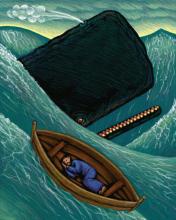
Sometimes, we teach children the oddest Bible stories.
It is certainly curious that we would decorate baby nurseries with images from the story of Noah’s Ark. The smiling elephants in the comically tiny boat must always be blocking out the mass of humanity and animal life drowning under a seemingly never-ending deluge.
The story of Jonah is another favorite in the Sunday School classroom. And for those of us who remember the story, one aspect of the narrative is most memorable. We remember that Jonah is eventually consumed by a whale or a fish or some sea creature. He spends three days in that great beast’s belly only to be jettisoned when he has finally learned his lesson.
But what lesson exactly did he learn? For some reason, being devoured and then regurgitated by a huge fish is more memorable than the point of this story. Jonah 3:10-4:11 contains the rest of the story, a story we would do well to consider anew today.

When confronted with the uncomfortable presence of so many relegated to the social margins of our society, we tend to shrink inward lest the enormity of life’s injustices overwhelm us. When we hear of another shooting, we heighten our vigilance with our own kids. We do not allow them to take public transportation. We drop them off and pick them up with little time for them to wait aimlessly. We fill their days with activities we can monitor. We are overwhelmed. Sadly, we turn our backs on the child whose parents are absent or on the community conditions that allow the crime to continue. When we see a disheveled, animated person, we bristle, avert our eyes, rehearse our, “I don’t have any money to give you today” response, or redirect our path to avoid them altogether. We are overwhelmed by social displacement. We do not know how to fix what is wrong. We feel inadequate. We experience dis-ease. But what if our overwhelmed, seemingly insignificant, and certainly inconvenient act is the very thing that will preserve life?
As the Pharaoh’s second in command in charge of administering the empire’s grain silos during the famine, Joseph preserved life long before his brothers appeared before him. As the dream-interpreting, forward-planning Vizier of Egypt, Joseph had already saved the lives of many—the entire Egyptian community and all those who travelled there seeking relief from the famine in the land.
Though his act of providing for his family seems magnanimous and extreme, as the Pharaoh’s senior administrator, Joseph had the weight of the entire empire at his command. Relocating his family from impoverished Canaan to resource-rich Egypt was an important thing, but it was a small thing. Sometimes a relatively small thing preserves life. Sometimes preserving life is the change in your pocket, the attentive eye contact that assures another that you see and value their humanity, or the willingness to help another find the help they need. Preserving life may mean giving more than the change in your pocket, changing laws that devalue the humanity of others or leveraging your privilege to connect those who need care with care-givers. All to preserve the life of many.